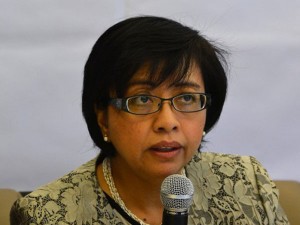MANILA, Philippines — With the filing of the Bangsamoro Basic Law (BBL) before Congress stalled, the Philippine government and the Moro Islamic Liberation Front (MILF) will meet again in Malaysia to discuss problems faced during Malacañang’s ongoing review.
In a statement issued Monday morning, government peace panel chairperson Miriam Coronel-Ferrer said the meeting of the negotiators has been prompted by the need to clarify some issues that arose from the review by a legal team of the Office of the President of the basic law drafted by the 15-member Bangsamoro Transition Commission (BTC).
Last April 22, the BTC submitted the full text of the Basic Law to Malacañang, which has since reviewed the document. President Benigno Aquino is scheduled to submit a draft of the law for urgent legislation when Congress reopens July 28.
Coronel-Ferrer acknowledged that the review “has raised some apprehension over some content where modifications were recommended by the OP review team.” She did not specify what were the modifications recommended.
Coronel-Ferrer described the meeting as “a workshop that would thresh out the various substantive matters that have arisen from the BTC submission and the subsequent OP review.”
MILF chief negotiator Mohagher Iqbal told the Philippine Daily Inquirer at the General Santos City airport that they would address the serious issues on the BBL.
Iqbal, who was on his way to Manila enroute to Kuala Lumpur, refused to divulge the changes made by a Aquino’s “senior government official.” He said about 60 percent of their draft was revised.
“The government can still meet its target of passing the law by next year. But there is also possibility it can’t make it on deadline,” he said.
Iqbal described the meeting in Kuala Lumpur as “special.” Ghadzali Jaafar, MILF vice chairman for political affairs, in an earlier phone interview, said the government recently returned to them the BBL draft with so many comments and revisions.
“Government legal experts made changes. While it’s part of the process, as much as possible we want to preserve the content,” Jaafar said.
Earlier, civil society peace advocates were worried about the “unhealthy speculations” that have cropped up regarding the fate of the draft BBL, hence, called for its full disclosure to the public.
There were even suggestions that BTC draft was “mangled” by Aquino’s legal team.
“… We are taking the necessary steps to ensure better understanding of the concerns, and to find a good resolution through frank and open discussion,” Coronel-Ferrer stressed.
Apart from the peace panels, members of the BTC and the International Contact Group (ICG) will also be in the meeting, according to Coronel-Ferrer.
She revealed that during a July 3 BTC en banc meeting in Cotabato City to consider the result of the OP review, the body passed a resolution “elevat(ing) the matter or process to the Panels for clarification, discussion and resolution of issues that may have been affected by the proposed revisions in the proposed Basic Law, in the higher interest of finding a lasting solution to the conflict in Mindanao.”
If enacted by Congress and ratified by qualified voters in the proposed territory, the Basic Law will serve as charter of the Bangsamoro entity that will replace, and will have greater power than the Autonomous Region in Muslim Mindanao (ARMM).
The grant of wider powers is premised on the need to establish a truly meaningful political autonomy for the Moro people.
But in a speech in Istanbul, Turkey late last month, Iqbal, also the BTC chair, said the Office of the President’s comments to the draft law were tantamount to providing the future Bangsamoro government with far less powers than what the ARMM has been enjoying.
Coronel-Ferrer allayed these fears.
“To begin with, neither the BTC draft nor the OP-reviewed text is so complete and perfect to leave no more room for discussion, or no other option but to choose between one or the other,” she explained.
“Closed options have never been the practice in our past negotiation. It shouldn’t be now in the implementation stage. Then and now, problem-solving has defined our modalities and this approach has produced the workable results that brought us this far,” she added.
Coronel-Ferrer said the ultimate parameter for evaluating the draft Basic Law would be “the signed documents that make up the Comprehensive Agreement on the Bangsamoro (CAB).”
“There is no backtracking on either side.”
However, Coronel-Ferrer hinted that in writing the Basic Law, the BTC might have gone beyond the CAB as reference.
“… Details or aspects beyond the signed documents are policy options that the BTC has taken and which the OP team took care to study and uphold as much as possible. But as in any legislation, there are various ramifications to any single text, or gaps that might not have appeared at first instance,” she said.
She emphasized that the goal would be to have a Basic Law “that the President can confidently submit to Congress and certify as urgent.”
“If we are going through this difficulty now, it is because we want the next stages to be less difficult not only between the government and the MILF, but among all the institutions and actors that will be or have been playing a role in the process,” Coronel-Ferrer explained.
RELATED STORIES
Palace overhauls draft of Bangsamoro basic law
Time running out on Bangsamoro law
